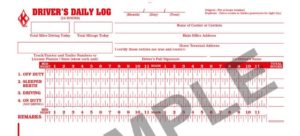
 Request FREE consultation - 1866-758-4529
Request FREE consultation - 1866-758-4529 
In three decades of litigating truck accident cases including many truck accidents on I10 out of Houston, I’m continuously amazed at how truck drivers and sometimes trucking companies can cover up abuses of the regulatory process by allowing or creating fake log books. Understanding how truck drivers cheat on their log books is crucial in these cases.
Sometimes, the safety violation is inadvertent, and sometimes, the safety violations are blatant and intended to circumvent the law.
The hours of service regulations under the Federal Motor Carrier Safety Regulations Section 395.8 set forth the minimum standards for keeping log books.

Drivers are required to record three different areas of activity on a daily basis.
Those are:
Section 395.8 of the FMCSR sets forth the maximum on-duty and driving time for truck drivers. The limitations on driver’s ability to be on the job or the road are intended to reduce the number of fatigued drivers causing crashes.
In the past, there were two main ways truck drivers cheated on their logbooks.
Some truck drivers are very conscious of the need to keep log books in case they are pulled over for an unexpected inspection. If the driver intends to violate the law, keeping duplicate sets of logbooks is one method utilized by drivers.
Filling out logs days later is the most used method for circumventing the hours of service regulations required by law.
A truck driver may choose to fill out the logbook when necessary for company purposes, and they do so sometimes on a weekly basis. This backtrack method ensures that the driver never discloses to the company a violation of the hours of service regulations.
One of the main ways a driver gets caught after a crash is by a truck accident lawyer comparing the driver’s logbooks with the shipping documents and also the black-box data that is ever more readily available on newer trucks.
Electronic logging devices are now mandatory for the majority of truck drivers engaged in interstate commerce. The ELD rules are intended to make log entries quicker, more accurate and easier to share. Additionally, the rules will serve an important function of helping to prevent cheating on log books.
Most of the time, when a truck driver is found falsifying his log books, the motor carrier takes action to prevent the infraction from occurring again. Sometimes, though, a motor carrier can be focused on the bottom line and not on the safety regulations and fail to enforce hours of service rules. Usually, this will be smaller trucking companies. Motor carriers can be held accountable for failing to stop cheating on log books.
There are a few exemptions from the compliance of the new electronic logging device rule for drivers of older vehicles and those who are not frequently required to maintain a log.
A recent study of the benefits of electronic hours of service recording was conclusive on the benefits for both compliance and safety.
Read More: Evidence That Should be Collected to Win a Truck Accident Case
Are you looking for an attorney for a truck accident? Call the best truck accident lawyers you can find for a free, no-obligation consultation, or contact us to request a consultation. You should always investigate the attorney you choose before you sign up. (281) 893-0760
https://www.ecfr.gov/cgi-bin/retrieveECFR?gp=1&ty=HTML&h=L&mc=true&=PART&n=pt49.5.395
https://blog.bigroad.com/blog/5-easy-fixes-for-hours-of-service-violations
https://www.govinfo.gov/content/pkg/FR-2015-12-16/pdf/2015-31336.pdf
The Significance of Truck Drivers’ Logbooks in Truck Accident Lawsuits
How do Truck Drivers Log Their Driving Time?
Logging Truck Crash Sends One to Hospital in Conroe
Why You Should Investigate Attorneys Before Choosing Representation